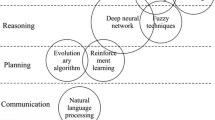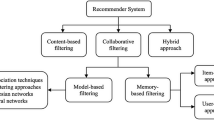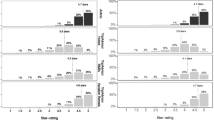Abstract
In recent years, with the development of technology, the shopping approach of people has moved towards pervasive online social shopping. As a result, how to create a recommendation algorithm that offers products based on the personal and different needs and tastes of people on social networks is a significant research issue. This article proposes a personality-based and trust-aware probabilistic product recommendation algorithm in social networks. We present a dynamic method for determining how similar people in social networks are. For this purpose, we consider the personality-based features of recommendation attributes of products in social networks. Then, the level of trust of products and types of correlations among the products is considered to create a probabilistic matrix of product recommendation. Moreover, for solving the cold start problem of products, we consider qualitative aspects of products while exploiting personality-based user behavior regarding their purchases. At last, the empirical experiments are conducted to analyze the impact of the algorithm’s different influence factors using the Amazon dataset. Moreover, the results of comprehensive experiments adopted to verify the proposed personalized recommendation algorithm’s effectiveness show that the proposed algorithm has the appropriate effectiveness and the higher accuracy.








Similar content being viewed by others
Change history
22 December 2022
A Correction to this paper has been published: https://doi.org/10.1007/s10489-022-04204-w
References
Achary NS, Patra BK (2021) Graph based hybrid approach for long-tail item recommendation in collaborative filtering. In 8th ACM IKDD CODS and 26th COMAD (pp. 426-426)
Ajaegbu C (2021) An optimized item-based collaborative filtering algorithm. J Ambient Intell Human Comput, 1-8
Celma O (2010) Music recommendation. In music recommendation and discovery (pp. 43–85). Springer, Berlin, Heidelberg
Chang Z, Ding D, Xia Y (2021) A graph-based QoS prediction approach for web service recommendation. Applied Intell, 1-15
Chen PY, Wu SY (2007) Does collaborative filtering technology impact sales? Empirical evidence from Amazon. Com. Empirical Evidence from Amazon. Com (July 8, 2007)
Cui L, Huang W, Yan Q, Yu FR, Wen Z, Lu N (2018) A novel context-aware recommendation algorithm with two-level SVD in social networks. Futur Gener Comput Syst 86:1459–1470
Cui L, Sun L, Fu X, Lu N, Zhang G (2017) Exploring a trust based recommendation approach for videos in online social network. Journal of Signal Processing Systems 86(2–3):207–219
Deng S, Huang L, Xu G, Wu X, Wu Z (2016) On deep learning for trust-aware recommendations in social networks. IEEE transactions on neural networks and learning systems 28(5):1164–1177
Diaby M, Viennet E, Launay T (2013) Toward the next generation of recruitment tools: an online social network-based job recommender system. In 2013 IEEE/ACM international conference on advances in social networks analysis and mining (ASONAM 2013) (pp. 821-828). IEEE
Dou K, Guo B, Kuang L (2019) A privacy-preserving multimedia recommendation in the context of social network based on weighted noise injection. Multimed Tools Appl 78(19):26907–26926
Eirinaki M, Louta MD, Varlamis I (2013) A trust-aware system for personalized user recommendations in social networks. IEEE transactions on systems, man, and cybernetics: systems 44(4):409–421
Feng S, Zhang H, Wang L, Liu L, Xu Y (2019) Detecting the latent associations hidden in multi-source information for better group recommendation. Knowl-Based Syst 171:56–68
Huang YM, Huang TC, Wang KT, Hwang WY (2009) A Markov-based recommendation model for exploring the transfer of learning on the web. J Educ Technol Soc 12(2):144–162
Ji K, Shen H (2016) Jointly modeling content, social network and ratings for explainable and cold-start recommendation. Neurocomputing 218:1–12
Khalid O, Khan MUS, Khan SU, Zomaya AY (2013) OmniSuggest: a ubiquitous cloud-based context-aware recommendation system for mobile social networks. IEEE Trans Serv Comput 7(3):401–414
Lauritzen SL, Dawid AP, Larsen BN, Leimer HG (1990) Independence properties of directed Markov fields. Networks 20(5):491–505
Lee WP, Ma CY (2016) Enhancing collaborative recommendation performance by combining user preference and trust-distrust propagation in social networks. Knowl-Based Syst 106:125–134
Li T, Liu A, Huang C (2016) A similarity scenario-based recommendation model with small disturbances for unknown items in social networks. IEEE Access 4:9251–9272
Li X, Wang M, Liang TP (2014) A multi-theoretical kernel-based approach to social network-based recommendation. Decis Support Syst 65:95–104
Li YS, Song MN, Hai-Hong E, Song JD (2014) Social recommendation algorithm fusing user interest social network. The Journal of China Universities of Posts and Telecommunications 21:26–33
Lingam G, Rout RR, Somayajulu DV (2018) Learning automata-based trust model for user recommendations in online social networks. Computers & Electrical Engineering 66:174–188
Margaris D, Vassilakis C, Georgiadis P (2016) Recommendation information diffusion in social networks considering user influence and semantics. Soc Netw Anal Min 6(1):1–22
Mata F, Torres-Ruiz M, Zagal R, Guzman G, Moreno-Ibarra M, Quintero R (2018) A cross-domain framework for designing healthcare mobile applications mining social networks to generate recommendations of training and nutrition planning. Telematics Inform 35(4):837–853
McAuley J, Pandey R, Leskovec J (2015) Inferring networks of substitutable and complementary products. In proceedings of the 21th ACM SIGKDD international conference on knowledge discovery and data mining (pp. 785-794)
McNally K, O’Mahony MP, Smyth B (2014) A comparative study of collaboration-based reputation models for social recommender systems. User Model User-Adap Inter 24(3):219–260
Musto C, Lops P, de Gemmis M, Semeraro G (2021) Context-aware graph-based recommendations exploiting personalized PageRank. Knowl-Based Syst 216:106806
Pelc A (1992) Reliable communication networks in byzantine link failures. Networks 22(5):441–459. https://doi.org/10.1002/net.3230220503
RaviKanth K, ChandraShekar K, Sreekanth K, Kumar PS (2019) Recommendation system for E-commerce by memory based and model based collaborative filtering. In international conference on soft computing and pattern recognition (pp. 123-129). Springer, Cham
Richa, & Bedi, P. (2021) Trust and distrust based cross-domain recommender system. Appl Artif Intell 35(4):326–351
Sanchez F, Barrilero M, Uribe S, Alvarez F, Tena A, Menendez JM (2012) Social and content hybrid image recommender system for mobile social networks. Mobile Networks and Applications 17(6):782–795
Seo YD, Kim YG, Lee E, Baik DK (2017) Personalized recommender system based on friendship strength in social network services. Expert Syst Appl 69:135–148
Shao K, Luo F, Mei NX, Liu ZT (2012) Normal distribution based dynamical recommendation trust model. Ruanjian Xuebao/Journal of Software 23(12):3130–3148
Stepan T, Morawski JM, Dick S, Miller J (2016) Incorporating spatial, temporal, and social context in recommendations for location-based social networks. IEEE Transactions on Computational Social Systems 3(4):164–175
Sun Z, Han L, Huang W, Wang X, Zeng X, Wang M, Yan H (2015) Recommender systems based on social networks. J Syst Softw 99:109–119
Tewari AS (2020) Generating items recommendations by fusing content and user-item based collaborative filtering. Procedia Computer Science 167:1934–1940
Truyen TT, Phung DQ, Venkatesh S (2007) Preference networks:Probabilistic models for recommendation systems. In: Proceedings of the sixth Australasian Conference on Data Mining and Analytics – Volume 70, AusDM ‘70, P. 195–202. Australian Computer Society, Inc, AUS
Wang Y, Yin G, Cai Z, Dong Y, Dong H (2015) A trust-based probabilistic recommendation model for social networks. J Netw Comput Appl 55:59–67
Xie W, Dong Q, Gao H (2014) A probabilistic recommendation method inspired by latent Dirichlet allocation model Math Problems Eng, 2014
Xu M, Liu S (2019) Semantic-enhanced and context-aware hybrid collaborative filtering for event recommendation in event-based social networks. IEEE Access 7:17493–17502
Yalcin E, Ismailoglu F, Bilge A (2021) An entropy empowered hybridized aggregation technique for group recommender systems. Expert Syst Appl 166:114111
Yu SJ (2012) The dynamic competitive recommendation algorithm in social network services. Inf Sci 187:1–14
Zhang W, Wang J, Feng W (2013) Combining latent factor model with location features for event-based group recommendation. In proceedings of the 19th ACM SIGKDD international conference on knowledge discovery and data mining (pp. 910-918)
Zheng X, Luo Y, Sun L, Ding X, Zhang J (2018) A novel social network hybrid recommender system based on hypergraph topologic structure. World Wide Web 21(4):985–1013
Author information
Authors and Affiliations
Corresponding author
Additional information
Publisher’s note
Springer Nature remains neutral with regard to jurisdictional claims in published maps and institutional affiliations.
The original online version of this article was revised: The published name of Prof. Amir Masoud Rahman was incorrect.
Rights and permissions
Springer Nature or its licensor holds exclusive rights to this article under a publishing agreement with the author(s) or other rightsholder(s); author self-archiving of the accepted manuscript version of this article is solely governed by the terms of such publishing agreement and applicable law.
About this article
Cite this article
Vatani, N., Rahmani, A.M. & Javadi, H.H.S. Personality-based and trust-aware products recommendation in social networks. Appl Intell 53, 879–903 (2023). https://doi.org/10.1007/s10489-022-03542-z
Accepted:
Published:
Issue Date:
DOI: https://doi.org/10.1007/s10489-022-03542-z




